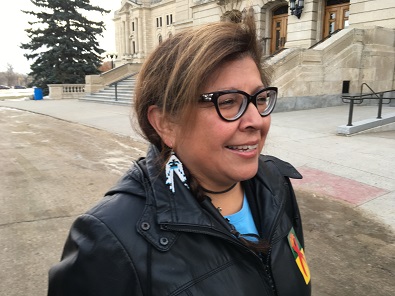All Nations Hope CEO, Margaret Poitras. Photo courtesy of Manfred Joehnck.
Two community HIV outreach groups are reaching out to the federal government, asking for it to reconsider major funding cuts.
AIDS Saskatoon and All Nations Hope in Regina are operating on transitional funding right now, but that money will dry up at the end of March.
It will leave a big hole, in the neighbourhood of $650,000 for the two organizations. All Nations Hope CEO, Margaret Poitras says her group will lose $350,000, or about a third of its overall funding. She says losing that much will severely restrict what the organization can do.
“This one third, this federal funding, it’s the brains of our operation, it’s the brains of All Nations Hope, it’s our long-term staff,” she said.
Poitras says All Nations is much more than an urban AIDS centre. She says outreach workers are providing services both on and off reserves, and many people move back and forth between the two. Poitras says the province has an HIV infection rate ranging from two to ten times the national average, with 80 per cent of the cases in the Aboriginal community.
“The federal government has a responsibility to Indigenous people in Saskatchewan and to Indigenous organizations that have been long-term advocates, and addressing this problem with Indigenous people in the province,” she said.
The average provincial infection rate in Saskatchewan is 14.5 infections per 100,000 people, compared to the national average of 6.4.
The infection rate in Prince Albert is 68 per 100,000, which is ten times the national average. The rate in Northern Saskatchewan is 32 per 100,000, which is more than five times the national average.
The overall rate increased six per cent in Saskatchewan last year to 170 new cases. Some of the increase can be attributed to more testing, which has nearly doubled over the past 10 years.
Sharing of dirty needles among intravenous drug users is responsible for more than 60 per cent of the new infections.
